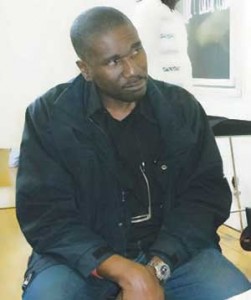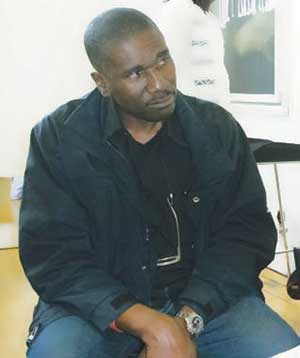Patrick-Jude Oteh is founder of the Jos Repertory Theatre (JRT) and artistic director/producer of the Jos Festival of Theatre, which ninth edition ran from March 10 to 14 at the Alliance Francaise in the Plateau State capital. In this interview with Assistant Life Editor, TERH AGBEDEH, who attended the festival, he tells the compelling story of practising theatre in Jos.
What has been the focus for the Jos Festival of Theatre in recent times?

We are trying to see what to do with disadvantaged people. Do you try to harness their talent or you just let them go to rot because that is part of the frustration that goes on. So, alongside the festival, we now have skills, training young people or even out-of-school graduates with employable skills. And then, even the artistes themselves, it is not enough to just do a job; how do you guarantee the next job? So it is not just enough to do one job, and when the high of that one job fades away, it is now like, what next? You must have arts managers that will be able to guarantee that you move from job to job. So we are trying to do all of that.
Strangely enough, we started in 2004. Immediately the festival assumed an international status – because we have had visitors from out of the country – and then suddenly, by 2005, 2006, 2007, they just quietly fizzled out.
That is the visitors?
Yes, we have had visitors from the UK…
In 2004, people from outside the country were still coming to Jos?
They came to participate in the festival. Then we had people from Scotland, the United States of America. So, what I am trying to say is that that was the high on which we started. And then somewhere along the line between 2007 and 2008, it fizzled out. By that time, the monthly travel advisory was beginning to crop up about Jos. If you go to Jos, you are on your own. Even till now, it is one of those areas that are classified almost like no-go areas. But in the last two to three years, it has been getting better.
We are also beginning to have a crop of directors that have gone through our training process to the point where they can now have their own funds or allocations to direct their own plays and involve other people. So, it is evolving; it is just that we are running at a very slow pace because of the circumstances in which we find ourselves, but we are still working. Over two years ago, we extended the festival to Abuja. So we take some of the plays from the festival to Abuja and share with the Abuja crowd, since they can no longer come to Jos.
Do you plan to move the festival out of Jos?
No, the main home of the festival is in Jos. Till two years ago, we have brought artistes from almost every state, with the exception of about seven or eight states, to the festival. We have had from Lagos, Oyo, Osun, Ogun, Edo, Rivers, Enugu; we are talking about whole troupes. They come in, have one or two performances, share their own experiences and then give way for other performances. So that has happened; but in the last two years, we have not been able to do that because the costs are getting prohibitive. We used to have a lot of cultural tourists coming in from Abuja to watch the plays in Jos, but in the likes of local advisory and all of that, what now happens is that when we finish the festival in Jos, we take two, three, sometimes four plays to Abuja, share with them over three, four weekends within the following month. If we finish in March, that will be April before the rains start. So far, that has worked.
You didn’t mention any of the Northern states?
We have had people from Bauchi, Gombe, Kano, and strangely enough, our scheduling in Kano used to be top-heavy. At least, within a season, we must have two or three performances in Kano, courtesy of the then British Council. So, Kano was one of our most exciting places to work in until a lot of things cropped up. First was Sharia and now, Boko Haram. Sharia made it very difficult for artistes to work because then a lot of things that had to do with entertainment were frowned upon. Somewhere along the line, with other things coming up, the British Council folded up in Kano and we lost a whole lot of audience in Kano. We have done Maiduguri (in Borno before, we have done Minna in Niger State).
You have been all over the country, but it seems that from what you just said, your biggest audience is embassy types and tourists. How has the reception been among the locals in Jos?
The reception has been fantastic, but for some weird reason, it has gotten bigger this year. We started with barely 200 people over a month, when the festival used to be on weekends. Now we have seven straight days and we are beginning now with an audience of over 800. So, it is growing. Two, three years ago, when the bomb blast happened at COCIN Church. We had opened the festival on Friday, so we did Friday, Saturday, and the bomb blast was on Sunday. That Sunday has been the day we recorded the highest number of attendees at any of the festivals. When the bomb blast happened, we decided to go ahead with the festival, and that evening, the whole place was filled up. It was as if people wanted to use the arts to assert their humanity. Yes it can be so bad, but we have got to live. And when the host, Allaince Francaise, saw what happened, we had performances start at 3pm when the state-wide curfew in Plateau at the height of the crisis started at 6pm.
The challenges have been enormous, but the festival has managed to stay where we are on the ninth edition now. But it has not been due to us; aside the Ford Foundation that helped us to jumpstart the festival, in the last four years, the United States Mission has also provided us with some money that we use to start. Now generate other funds locally.
Why did you found JRT?
When I first came to this town, there were a lot of us NUTASITES – those of us that met during the Nigerian Universities of Theatre Arts Festivals – all the universities studying theatre arts then. So there were a lot of us in town in insurance and banking; some were teaching, some in the radio stations. We were like, let’s get together and start something. But it was easier to meet to read poetry, and act plays. But when it came to starting an ongoing concern, taking theatre to schools, it became a challenge because of timing and finance. After I got married, my wife said: why don’t you take this thing up and see how far we can go with it? My wife is also a theatre person. And that was just it. So, it started like a very casual discussion and then we took it up from there. We started the first set of plays in 1997, going round schools. After that, we started full implementation, like a theatre organisation, in 2000.
While others were in insurance, banking and the rest, where were you?
I was selling food (laughter). Well, I came into Jos as a student to do my postgraduate studies. It was while I was here as a student that we all met and started talking.
What year?
I came in as a student in 1989 and finished early 1991. But by then, I was already working with Collective Artistes of the Performing Arts, Chuck Mike’s group. So I went back to join them, but there were a lot of opportunities here, especially in the area of food. I was coming from a disadvantaged family and I decided that it was a business to go into. I discussed with Chuck and he said he was letting me go with his blessing. In fact, Chuck came to visit me in Jos on three occasions to find out how I was doing. I mean, he was just a very rare human being, and here we are today. But I left food fully in 2005/06, and my wife took over. I went to teach briefly in 2000 to 2002 at the University of Jos. Before then, I spent 17 years cooking. It was called PeeJay’s Foods and we just closed it in 2011.
Would you say JRT has found a home in Alliance Francaise?
For now, yes; no theatre company can ever say you have found a home except it is your own structure. Alliance Francaise, in the last five years, has been home and also the French Institute in Abuja has been very welcoming of our programmes. So, for now, this is home.
How about sponsorship?
In terms of sponsorship, it has been tough and rough. Thanks to the U.S. Mission; this is the fourth edition that they are supporting. We also want to thank Grand Cereals Limited, which has supported us since inception of the festival in 2004. It has been a yearly thing. This year also, Hamaz Communications has joined. Then we have two organisations under equity in the UK: International Performance Aid Trust and International Committee for Actors’ Freedom. What they send takes care of two or three actors, but it goes a long way to show the kind of support we receive. But this year, especially with the elections, fundraising has been tough but we are very lucky that we started very early. There are also some individuals that have also continued to support us.




